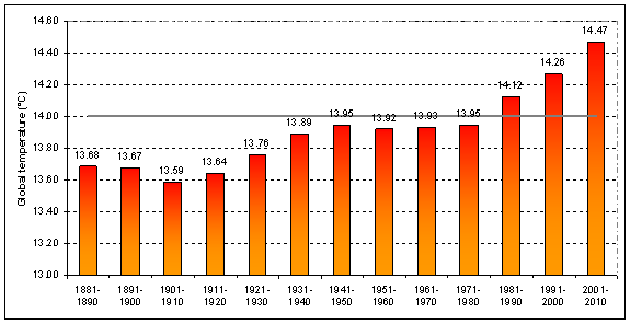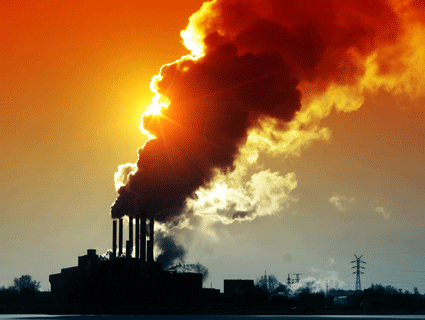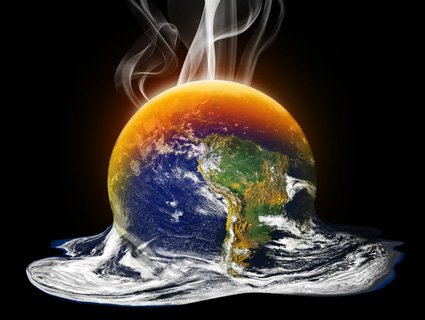
Global average temperatures by decade. Credit: <a href="http://www.wmo.int/pages/mediacentre/press_releases/pr_976_en.html">World Meteorological Organization</a>
Eli Lehrer wants conservatives to take global warming seriously. He’s the president of the R Street Institute, a free-market think tank whose board includes former South Carolina Republican Rep. Bob Inglis—a celebrated conservative apostate on climate change—and another freethinking conservative, David Frum.
Recently, Lehrer took to the pages of the Weekly Standard to make the conservative case for a carbon tax (while also criticizing President Obama’s recent climate proposals). “Rather than pretend climate change isn’t a problem, there are ample opportunities for Republicans to point out the obvious flaws in the left’s plans to deal with it and offer alternatives of their own,” writes Lehrer. He adds that the scientific debate over whether humans are causing climate change is pretty much over:
Nobody seriously involved in the policy debate over climate change—not even those the left unfairly labels as “deniers”—actually denies that humans influence global climate. There’s also no dispute that the Earth is warmer than it was before the Industrial Revolution or that carbon dioxide and other greenhouse gases can trap heat energy.
Unfortunately, however, it looks like many other influential voices on the right are still trying to find “scientific” reasons to discount or minimize global warming.
Lately, a favored argument is to suggest that global warming may have stopped after the year 1998. Versions of this claim were articulated by Washington Post columnist Charles Krauthammer, Texas Sen. Ted Cruz, and numerous others in response to Obama’s recent climate speech. Or as Krauthammer put it: “Global temperatures have been flat for 16 years—a curious time to unveil a grand, hugely costly, socially disruptive anti-warming program.”
This is very misleading. First, if you’re simply looking at record temperature years, then 2010 and 2005 both beat 1998 for the highest global average temperature, according to NASA. The World Meteorological Organization agrees that 2010 is the hottest year on record, “followed closely by 2005.” The WMO also notes that the 2000s were the hottest decade on record (see graphic above).
A more sophisticated version of this latest “skeptic” argument is to note that the rate of global warming in the last 15 years has been slower, or has been “leveling off.” But as the blog Skeptical Science points out, that’s only true for atmospheric temperatures—which, in turn, only reflect a small part of the overall global warming picture. Warming of other parts of the planet, and especially the oceans, proceeds apace.
“Conservatives should care about global warming,” writes Lehrer at the end of his Weekly Standard article. Alas, many still seem to be looking for a reason not to.
















